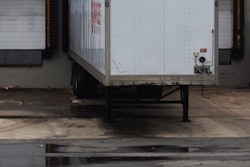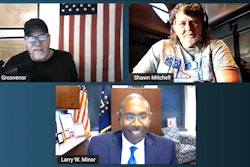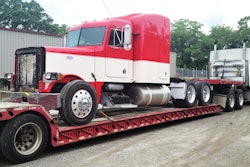Recent news has made clear that within the Department of Transportation's Office of Inspector General (OIG) there is certainly a priority placed on instances of load payment theft that involve fraudulent double brokering and identity theft. DOT's Midwest region lead for the OIG appears to have led parts of the investigation into the recently-busted Mexico resident who posed as a carrier, stealing that carrier's identity, then posing as a broker, to execute his scheme, making away with payment.
Yet perhaps more pernicious and perhaps more widespread are issues related to duly authorized motor carriers and brokers clearly working together to essentially misrepresent themselves into a load that comes from a very real broker or shipper and eventually makes its way to a very real carrier, but at a rate that's reduced from the original load agreement. This sort of double brokering relies on the ease of entry into the business and the low-manpower issues authorities have often cited over the last decade when asked why, for instance, the misrepresentation section of the broker regs (49 CFR 371.7) wasn't being enforced with any real might, given the wide extent of this problem.
[Related: How do you know you're working with a double broker? Increasingly, it's hard to tell]
I've written about this kind of scheme in recent memory, and some in the enforcement/legal community describe it with an analogy to the hub and spokes of a wheel, with untold numbers of carrier authorities set up as spokes and all connected to a brokerage authority at the hub to whom these carriers pass loads negotiated on internet boards to broker out to real carriers at reduced rates. The entire operation then pockets the difference, the load gets moved, and everybody gets paid, including the organized double brokers.

Hub-and-spoke well describes the structure of how these rings are set up, yet I like a somewhat different analogy for the ultimate effects of their proliferation. Think of such a ring as a big hydra-headed leech sucking the profits out of the spot market, distorting that market to unknown ends with activity on the boards -- at the expense of ... you got it, independent owner-operators and small carriers, and brokers for that matter, who operate aboveboard.
When Matt Cole and I spoke to FMCSA's new Administrator Robin Hutcheson a couple of weeks ago, I asked her just what the agency was doing or might be able to do about these rings, if anything, particularly given they take advantage of the FMCSA's own registration system to ply an illegal trade.
Her answer? We recognize the problem and we're working on it, essentially anyway.
She pointed to approaches in the National Roadway Safety Strategy aimed at "closing some loopholes," she said. "You're describing what could be considered a loophole," the ability of entities to be duly authorized as carriers with no intention of ever moving freight, or brokers with intent only to misrepresent themselves into loads.
I don't find the word loophole in the NRSS document myself, but I did find this: "While safe behaviors among commercial drivers is critical, it is also important to leverage other approaches to make sure that commercial driving is a safe, healthy, and viable profession, in recognition of its vital importance to the Nation’s economic prosperity." (My emphasis added on viable -- the less money sucked out of the market through these schemes, the more viable the profession of trucking becomes, no?)
Hutcheson added: "Our goal is to prevent unsafe drivers, unsafe carriers or anyone who otherwise should not be registered from ever being able to operate or be on the road. That does happen through our registration system" in part, and Hutcheson noted the team at FMCSA was exploring changes that might strengthen the agency's ability to identify bad actors before they've got the paper (motor carrier or broker authority) that allows them to ply their "business" on the boards.
Yet that particular notion of a fix is a "long lead thing, and that can be frustrating" for honest players, Hutcheson acknowledged. "We are aware of the issues, even more broadly than what you describe, and we are looking at our registration system."
I asked another question, too. Just how can carriers and brokers help the agency and the DOT more broadly to shut these operations down?
Hutcheson suggested she'd get back to me on that. I haven't heard from FMCSA in the couple weeks that have transpired since, but my colleague Jason Cannon over at Overdrive sister publication CCJ elevated the question around double brokering by duly authorized entities at a media Q&A with DOT Secretary Pete Buttigieg at the American Trucking Associations' annual conference just this week.
Here's what he said, not a terrible description of what's occurred over these past few years' worth of a surge in these schemes:
"The environment that we're in, especially what it did to spot rates, creates all kinds of opportunities for abuse and I think we've seen that in every sector that touches shipping; that it just becomes... anytime you have a shortage of availability and anytime you have stupendous profitability on certain routes or certain situations, you see some unsavory actors start to look at how they can take advantage of that."
Yet it's also sort of a non-answer answer, isn't it, to a question about what the agency was doing to help combat the problem?
FMCSA Administrator Hutcheson was on hand for that Q&A, too, and she initially pivoted to the broker-transparency issue that reared its head yet again during the early days of the pandemic when rates dove. "We believe in broker transparency," she said. "We have an active petition right now. You probably well know that, but I would say keep your eyes open in the early part of 2023 for some additional information. [But in the meantime] we would like to hear from you if that's happening to you."
Carriers and brokers, let's well hold her to that. If you've been caught up in a double-brokering scheme on either end of the chain, report it. The more information folks at the DOT OIG have, the better they'd be able to bring bad actors to account. FMCSA, too.
Working together, plenty of brokers and owner-ops/small carriers have gotten quite good at catching folks in the double-brokering act on both ends of the exchange, reporting those actors to the load boards, with some success shutting them down that way, at least temporarily. (Frustration with the boards, too, is high among some, I know, given instances of slow response or double-brokering entities getting around efforts to shut accounts down; more than one of you has likened the whole process to playing whack-a-mole.)
I outlined just how to make a whistleblower complaint to the DOT's Office of Inspector General in this story, part of our early 2020 eight-part series on issues of nonpayment, identity theft and more in the brokerage space. The basics of that outline still apply: Investigatory resources can be brought to bear in dealings where fraudulent intent is suspected, whether involving identity theft, a “hit it and move on” scam or a double-brokering scam -- the latter two where a broker/carrier obtains federal authority just to misrepresent themselves into a freight transaction. DOT OIG's whistleblower hotline to report such matters you'll find via OIG.DOT.gov/hotline. There, note phone and email contacts (800-424-9071 and [email protected]), as well as an online form for detailing the complaint.
As the past case of William Hickey and the more recent ID-theft case of Alexis Castillo Padilla, make clear, successful prosecutions have in fact started with investigators at DOT OIG before being referred elsewhere.
Yet Hutcheson's FMCSA also hosts a reporting avenue direct to the agency, its National Consumer Complaint Database -- earlier this year, the agency signaled that it would be adding a freight broker-specific category to that system for trucking pros to lodge complaints against. A scan of the system suggests that hasn't happened as yet, though given duly-authorized motor carriers posing as brokers are involved in most of these schemes, selecting the "Truck company" complaint section could work there.
Here's a link to the NCCDB -- Hutcheson asked for it, let's let her hear about the bad actors.
[Related: 3 double-brokering scams that can result in theft of more than just money]











